- Home
- Simon Mayo
Itchcraft
Itchcraft Read online
Contents
Cover
About the Book
Title Page
Dedication
Chapter 1
Chapter 2
Chapter 3
Chapter 4
Chapter 5
Chapter 6
Chapter 7
Chapter 8
Chapter 9
Chapter 10
Chapter 11
Chapter 12
Chapter 13
Chapter 14
Chapter 15
Chapter 16
Chapter 17
Chapter 18
Chapter 19
Chapter 20
Chapter 21
Chapter 22
Chapter 23
Chapter 24
Chapter 25
Chapter 26
Chapter 27
Chapter 28
Chapter 29
Chapter 30
Chapter 31
Chapter 32
Author’s Note
Acknowledgements
About the Author
Also by Simon Mayo
Copyright
About the Book
Itch is just an ordinary boy with a hobby – a mission to collect the elements of the Periodic Table. But somehow trouble keeps finding him. Having stopped a brand–new radioactive element from falling into the hands of criminals and terrorists, he has made himself a target.
Exploding banknotes and vandalized ancient monuments are at the heart of the puzzle Itch faces. He knows the lives of those closest to him are at risk. Now he must track down a deadly enemy who will stop at nothing to take his revenge . . .
For Hilary
83 in a world of 38
1
The Trans-Saharan Highway, Lagos, Nigeria
30 December
The armour-plated Mercedes swerved to avoid a pothole the size of a snooker table. The expensive suspension could smooth out the roughness of most roads, but the A1 from the Murtala Muhammed International Airport into Lagos was beyond repair. One wheel clipped the edge of the ruptured tarmac and the jolt shook its passengers. They grabbed the leather arms of the car’s upholstery, and the loud cursing came in French and Dutch. Christophe Revere and Jan Van Den Hauwe, the co-chairs of oil multinational Greencorps, were not happy.
‘Dammit – don’t they know how to build roads here?’
‘The answer to that, Christophe, is clearly no. The only way things get done here is through bribery and corruption. We know that much, surely?’
The Frenchman smiled and chanced another sip of his expensive brandy. ‘We do, Jan – of course we do. We caused most of it, I believe.’ He dabbed his lips with a handkerchief and checked his seat belt. The onboard satellite TV was tuned to a finance channel; both men watched the continuous scroll of information across the screen.
‘More European madness, Christophe! They learn nothing . . .’
Another big swerve, and some of the spirit splashed onto the carpet. Revere closed his eyes as if in prayer. ‘Give me strength . . .’ he muttered.
Both men peered through their own tinted windows at the road outside, but the streetlights and neon advertising weren’t bright enough to pierce the darkened glass. Ahead, the view through the windscreen was clearer, the powerful headlights illuminating a nightmarish, crazy night-time rush hour.
‘It’s gone midnight, for God’s sake! Why so busy?’ Van Den Hauwe aimed his question at the chauffeur, who spoke into his intercom, though his eyes never left the road.
‘It is always like this, sir.’ The driver glanced in his wing mirror as he pulled first into the outside lane, and then – to gasps from his passengers – into the other carriageway.
‘What the . . .!’ The oncoming traffic, now heading straight for them, swerved out of the way with barely a blast on the horn or flash of headlights. As though it was normal.
‘Big hole in the road, sir,’ said the driver. ‘We call it “Mama’s Dig”. Everyone knows about it.’
The Dutchman shook his head. ‘You actually have names for the potholes? This is one crazy country.’
The driver smiled. ‘Yes, sir. You got that right!’
In front, their security team – in a polished four-by-four – seemed to be having an easier time, smoothly weaving between the holes in the tarmac, the dawdling, ancient saloons and the racing sports cars. It sounded as though the driver’s hand must be glued to the horn, with yells and gestures aimed at any motorist who really annoyed him. On one occasion the barrel of a gun appeared from a passenger window, aimed at the driver of a soft-top BMW trying to overtake – who quickly dropped back behind the four-by-four and the Mercedes, leaving the Lagos road at the next exit.
The traffic thinned as most cars took the filter for downtown Lagos; the small Greencorps convoy continued south, following signs for Tin Can Island.
‘I’m nervous about this meeting, Jan,’ Revere said to his colleague. ‘Who says this new Head of Police is trustworthy? And why do we have to meet so far out of town? I don’t like it.’
Van Den Hauwe swivelled slightly to face him. ‘I don’t like it either, but after the spill, and Flowerdew’s’ – he searched for the right word – ‘insanity, we have to get control of this town again, Christophe. It used to be ours, but not any more. If we can buy ourselves the Head of Police – well, it’s a start. He sounded willing. Which is why we’re both here.’
The car swung left, following a sign for the Apapa Oworonshoki Expressway, and a dark expanse of lagoon was briefly visible through the Mercedes’ windscreen. It was the driver’s sharp intake of breath that let his passengers know that all was not well. They looked up from their glowing phone screens.
‘What? What’s up?’ asked Van Den Hauwe, but the empty road ahead gave him his answer.
‘We’ve lost our security,’ said Revere calmly.
They leaned forward to peer through the windscreen, but the twin headlights just picked out the dirt-covered tarmac, a few telegraph poles and an empty road.
‘Where did they go?’ shouted Van Den Hauwe. He pressed a button on his door; the window slid down and he put his head out into the sweltering night. The smell of the sea, along with oil and burning rubber, filled the car, and Revere pulled him back inside.
‘Someone’s paid them to disappear. I think we should go back,’ he said. ‘Back to the airport.’
The driver was looking worried now. The Mercedes might have all the safety features that money could buy, but he knew that Lagos was a lawless town, and if there was a price on your head . . . He swung the car round.
‘Not much traffic for an “expressway”,’ said Van Den Hauwe quietly.
Revere nodded. ‘None at all. I imagine we’ll have company shortly.’
They were accelerating into a corner when the first of the pick-ups shot out in front of them. Three silver and grey Isuzu Rodeos spun on smoking tyres till they were facing the oncoming Mercedes. The Greencorps men were already braced and holding the leather straps that hung from the ceiling, but their seat belts snapped tightly around them as their driver stood on the brake. The car had an impressive stopping distance, but the pick-ups were too close, and there was the sickening metal-on-metal thud of a collision. While the air was still filled with sand and smoke, black-clad figures jumped out of the trucks.
‘Back! Back! Back!’ yelled Revere, and the driver threw the car into reverse. It pulled away from the tangle of bumpers and backed up to the edge of the road. As they spun away from the pick-ups, new headlights cut though the dark. Three more trucks hurtled round the corner and screeched to a halt, cutting off the Mercedes’ escape.
‘Looks like someone wants to talk,’ said Van Den Hauwe.
‘Let’s hope that’s all they want,’ said Revere, and
the Greencorps men sat and waited.
Palmeitkraal, Western Cape, South Africa
‘Catch!’ shouted Chloe.
‘Why?’ said Itch as the ball went sailing past his head, bouncing into the dusty scrubland.
‘You could at least have tried,’ said his sister.
‘I could have, yes,’ said Itch. He was on his hands and knees, scraping earth and stones towards him with both hands. Great clouds of dark sand and dust swirled around him, much of it settling in his wavy blond hair and sticking to his sweat-soaked T-shirt.
‘Does Dad know what you’re doing? I’m sure he said you’re not allowed to do illegal experiments.’ Chloe walked over to her brother, looking over his shoulder.
‘No, you said that,’ said Itch, packing soil around a glass jar.
‘It is illegal, though, isn’t it?’ persisted Chloe.
‘In England it is. But we aren’t in England, are we?’ He looked up and smiled at her. ‘Come on, Chloe. I’ve always wanted to try this – give us a break.’
‘If it’s illegal at home, it’s probably illegal in South Africa – have you checked?’
‘OK, let me ask . . .’ Itch looked theatrically around the hilly terrain: the low evergreen vegetation, the patches of bare sandstone and deserted old mine dwellings. ‘No, no one around.’ He smiled again. ‘I’ll just have to get on with it.’
Chloe sighed. ‘Yeah, ’cos “just getting on with it” has been so great for you in the past. What did you say you were doing?’
‘Stump removal,’ said Itch.
‘But I don’t see any tree stumps.’
‘Well, the key word is removal. It’ll remove anything, I think.’ He measured out some white powder into the jar.
‘Looks scary,’ said Chloe.
‘Really?’ said Itch. ‘It’s only KNO3.’
‘Itch, I don’t play your stupid games. In English please. I know K is potassium . . .’
‘Potassium nitrate. Or saltpetre.’
‘And the other powder?’
‘Secret.’
‘Let me guess. It goes bang?’
‘Can do,’ said Itch. ‘If you mix them together and set fire to it.’
‘That’s what I was afraid of,’ said Chloe, walking away to retrieve the ball. ‘Sure you wouldn’t prefer to play “catch”?’
Lagos, Nigeria
Whoever they were expecting to emerge from the six trucks, Van Den Hauwe and Revere stared open-mouthed at the figures who assembled in a semicircle in front of the Mercedes. Six women now stood in their headlights, dressed mainly in black denim and leather jackets, staring into the windscreen. Each of them wore a khaki cap pulled low over their eyes.
‘Well, who are you?’ exclaimed Van Den Hauwe, his eyes wide with surprise.
They looked young – twenties maybe – and a mix of Nigerian, white European and Thai . . . Malay, possibly. They stood motionless.
‘Our move, Christophe, I think.’
‘Agreed.’
Both men opened their doors and climbed out.
‘Er, good evening, ladies,’ tried Revere, standing by the open door. ‘You must want to see us very much.’
‘Kill the lights,’ shouted a voice.
The driver, now with his window open, hit the switch and the car went dark. Two powerful torches came on and lit up the oilmen, who had started to sweat profusely.
‘Walk to the front of the car.’ The voice was heavily accented and authoritative – both men did as they were told. ‘Kneel down!’
Revere and Van Den Hauwe looked at each other, then at the women. ‘Who are you? Have we upset you? I’m sure we can do business together, but—’
‘Kneel down!’ This time the command came with an added threat: the click of a gun’s safety catch being removed.
Both men knelt in the dust. The six walked a few steps towards the car. The women at each end held the torches; one in the middle held the gun. Tall, with olive skin and jet-black hair, she looked at the driver. ‘Run away. Now. Take off.’
He didn’t need to be told twice. He flung his door open and sprinted away into the night.
The woman with the gun spoke again. ‘My name is Leila. These are my friends: Aisha, Sade, Tobi, Chika and Dada.’ Heads nodded as names were mentioned, as though they were athletes being introduced to the spectators before a race. Each was now little more than a silhouette to the kneeling oilmen.
‘How can we—?’ began the Frenchman.
‘We used to work for you,’ interrupted Leila, ‘but then you killed our friend.’
‘I’m sure that’s not true . . .’ said Van Den Hauwe, squinting as the torch shone in his face.
Leila spoke again, her voice raised. ‘We used to dive with Shivvi Tan Fook. Now she’s dead and it’s your fault.’
There were murmurs of assent from the others, and what sounded like curses spat in the direction of the kneeling men. Both Van Den Hauwe and Revere started to protest, but the diver with braided hair identified as Chika jumped forward, crouching just in front of them. Grit kicked up by her Converse hi-tops settled over their tasselled loafers. She put her finger in front of her lips.
‘You don’t have to say anything. We know you didn’t actually kill her yourself – we know that was Flowerdew. But we haven’t got him—’
‘Yet!’ called one of the others, and they all nodded.
Chika smiled, her teeth brilliant white. ‘Right. Not yet. But we have got you: you abandoned her, so you have to pay.’ She produced a knife from her Converse and both men recoiled, falling back against the radiator grille of the Mercedes.
‘Chika, no!’ called Leila. ‘We agreed, remember?’
‘Not yet, Chika,’ called another voice.
Chika glanced back at Leila, then stared at the ground, carving grooves in the dust. Then she nodded and sheathed her knife again.
‘I say shoot them now.’ Five heads turned to look at the white woman with black hair tied back in a ponytail. ‘Why wait? This is our moment. We owe Shivvi. Just do it.’
‘But, Aisha, we agreed,’ said Leila. ‘We wait. Maybe sell them on. You know we’d get a good price.’
‘I did think that,’ said Aisha. ‘But then I hadn’t looked into their eyes. They’re disgusting – their kind always win, always get away with it.’ There were nods of agreement at that. ‘But not this time . . .’
Leila looked at her friends again; they all returned her look, each one nodding in turn. ‘Very well.’ She stepped forward. ‘Stand up and turn round.’ She raised her gun.
Stumbling to his feet, Revere pleaded, ‘We have money! How much do you need? Please—’
‘Turn round!’ shouted Leila. ‘Who’s first? Alphabetical order, maybe?’ She walked round to where Jan Van Den Hauwe was gripping the bonnet of the Mercedes. He squeezed his eyes shut as she touched the gun barrel to his temple. ‘Happy New Year, Jan,’ she said, and pulled the trigger.
‘Happy New Year, Chloe,’ said Itch, and a thunderous explosion tore through the hills. Brother and sister crouched in the dilapidated house and winced as the first clods of earth started raining down on them. A shower of stones followed. Ears ringing and eyes watering from the swirling clouds of dust particles, they peered through the open space that had once been a window.
‘Wow,’ said Itch in hushed tones. A small mushroom cloud had formed twenty metres above the explosion. As they watched, it moved and changed shape; sand and smoke were drawn in and upwards, then seemed to fold and rotate around the rim. After a few seconds it drifted and dissolved, the grit and earth falling like hail.
‘But . . . that . . .’ said Chloe, staring at the brown haze that still hung in the air.
‘. . . wasn’t a nuclear explosion, no,’ finished Itch. ‘Though it was amazing!’
‘But it was a mushroom shape. I thought . . .’
‘Just what happens when you have a large blast. Though I’ve never seen one before. I suggested it once to Colonel Fairnie, but he said no.’
‘Can’t think why,’ said Chloe. ‘Can you imagine the panic if a mushroom cloud like that appeared above our house? Fairnie got that one right.’
Jim Fairnie had led the MI5 team that had tried to protect Itch after his discovery of eight pieces of the fiercely radioactive element 126. He had promised to stay in touch and was available if Itch ever needed him.
If it hadn’t been for the ringing in their ears, Itch and Chloe would have heard the approaching Land Rover sooner.
‘Dad’s here,’ said Chloe. ‘This could be fun.’
Nicholas Lofte arrived in a cloud of dust, a brown haze hanging in the air behind the vehicle. Hurtling past the scene of the explosion, he headed towards the old mining cottage where his younger son and daughter stood. He jumped out of the driver’s seat, the car still lurching from the abrupt stop.
‘What happened? You both OK?’ He ran over and took Itch by the shoulders. ‘That was loud, Itch – explain!’
‘Just stump removal, Dad. You should have seen it! We got a mushroom cloud and everything!’
‘Er, we?’ said Chloe.
‘OK, yeah – just me, then. Dad, it was huge—’
‘I know it was huge, son – I heard it down by the mine. I ran out of the office and saw the cloud forming. I was terrified, Itch – my heart is still racing. You’re both OK, then?’
‘Course we are, Dad. It was a bit louder than I expected,’ said Itch, his eyes still wide with excitement, ‘and we had dust and stuff raining down, but it was pretty cool.’
He couldn’t stop grinning, and Nicholas’s face twitched. Caught between anger and admiration, Nicholas Lofte stood looking at his son. At fifteen, Itch was six foot and still growing, his twelve-year-old sister only nine inches behind. Itch’s wavy blond hair was filled with earth and dirt; when he spoke or moved, it showered into his face.
‘At least you kept some eyebrows this time,’ said Nicholas, smiling, and they all started to laugh. Itch had lost his eyebrows twice before – the last time just weeks ago, when the Fitzherbert School had burst into flames. Itch and his cousin Jack had been lucky to escape with their lives.
‘OK, I admit it: it did look pretty impressive . . . which doesn’t make it right,’ Nicholas added quickly. ‘You should have told me what you were doing, Itch. I thought you might have had your fill of danger for a while.’

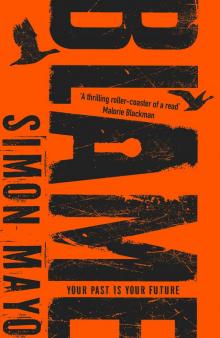 Blame
Blame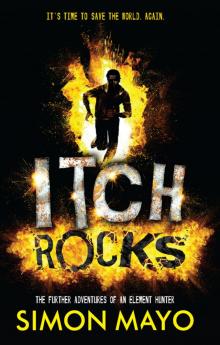 Itch Rocks
Itch Rocks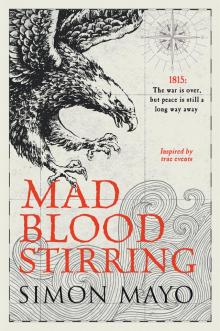 Mad Blood Stirring
Mad Blood Stirring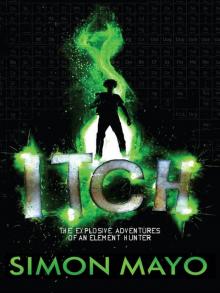 Itch
Itch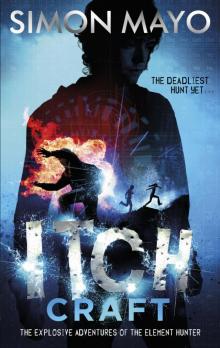 Itchcraft
Itchcraft